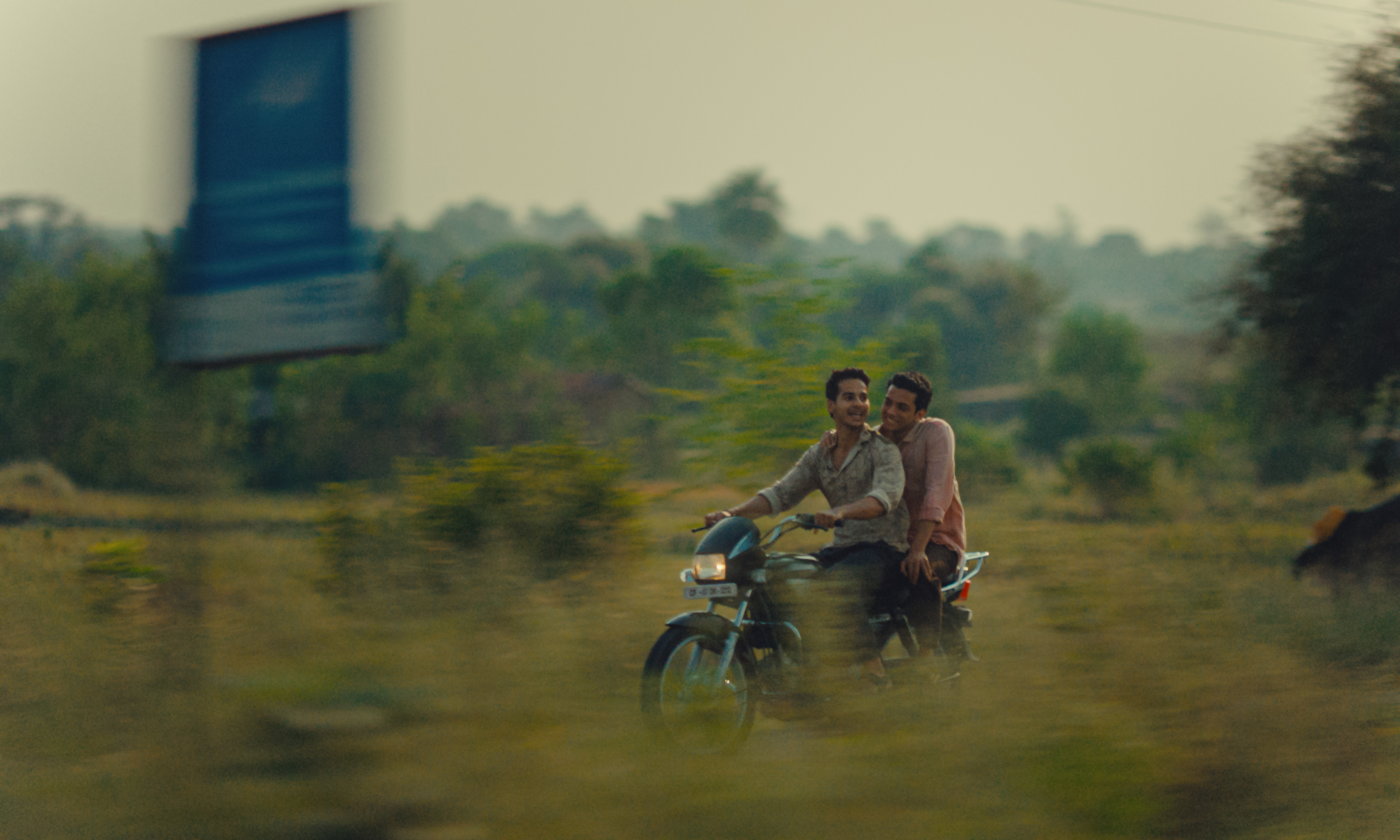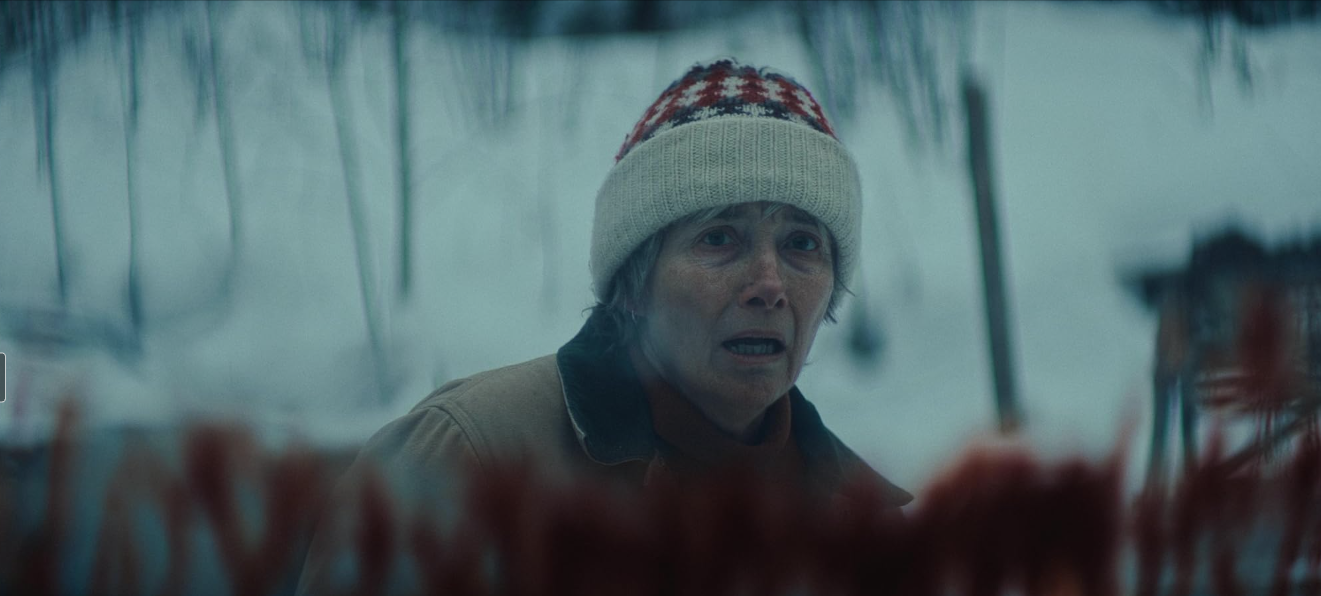Dead of Winter
(98 mins, 15) Directed by Brian Kirk; starring Emma Thompson, Judy Greer, Marc Menchaca
Emma Thompson dons her ice-fishing thermals and her best gosh-darn-it Minnesota accent for this uneven subzero thriller. She plays recently widowed Barb, who is honouring her late husband’s memory with a solo trip to the remote frozen lake that was the location of their first date. But the fishing must wait. Barb stumbles across an unfolding crime: a young woman has been kidnapped and is imprisoned in the basement of a ramshackle cabin (for reasons that will become gruesomely apparent). Barb must draw upon her outdoorsy resourcefulness to outwit the teenager’s captors.
And if that was all there was to it, this Fargo-inspired winter noir might have worked rather well – a lean, mean little crime picture carried by a disarmingly polite older lady with killer instincts and the sewing skills to patch up her own bullet wounds if need be. But the film’s main assets – its taut action and the crisply unforgiving monochrome colour palette – are repeatedly interrupted by unwieldy pastel-hued flashbacks to Barb’s early life.
We get bogged down in saccharine glimpses of the young Barb (played by Thompson’s own daughter, Gaia Wise) being courted by hubby-to-be Karl (Cúán Hosty-Blaney); heartstring-tugging but dramatically redundant scenes of a pregnant Barb miscarrying. It’s a clumsy storytelling device that, along with an intrusive, hand-holding score, defuses the tension and distracts us from the most enjoyable aspects of the picture: the always impressive Thompson going head to head with the film’s villain, played by Judy Greer with a purple, padded snowsuit and face as hard and sharp as a hunting knife.

The ‘terrific’ Ebada Hassan and Safiyya Ingar play indoctrinated schoolgirls in Brides
Brides
(93 mins, 15) Directed by Nadia Fall; starring Ebada Hassan, Safiyya Ingar, Yusra Warsama
The thing that tends to be overlooked in much of the media coverage of “Isis brides” – girls who, like Shamima Begum in 2015, travelled to Syria to join Islamic State – is that many of them were vulnerable and impressionable children. The feature film debut of the playwright and theatre director Nadia Fall (the artistic director of the Young Vic) redresses the balance, taking an empathetic and humane view of teenagers who are more routinely condemned for their actions.
Doe (Ebada Hassan) and Muna (Safiyya Ingar) are schoolfriends, both ostracised and bullied in a provincial small town in which racism provides a constant background noise. Quiet, reserved Doe, of Somali descent, is a devout Muslim; garrulous and confrontational Muna rebels against her religion, school and her strict Pakistani family. They have little in common, bar a childlike faith that there’s a better, more meaningful life somewhere over the border between Turkey and Syria. Both young actors are terrific; their friendship is a mercurial and fiery thing given to flame-outs and smouldering sulks. A friendship, in other words, between children: indoctrinated and trafficked kids who have no real idea of what they are getting into.

Ishaan Khatter and Vishal Jethwa in the heartfelt Indian drama Homebound
Homebound
(122 mins, 12A) Directed by Neeraj Ghaywan; starring Ishaan Khatter, Vishal Jethwa, Janhvi Kapoor
Lifelong friends Shoaib (Ishaan Khatter) and Chandan (Vishal Jethwa) aspire to a future that is denied them in their home town in northern India. A Muslim and a low-caste Dalit respectively, they both take the massively oversubscribed exam to become police officers. But misfortunes and injustices drive a wedge between the pair, threatening to rob both of any chance for a better life.
Masaan director Neeraj Ghaywan’s second film, which is India’s submission for the 2026 best international feature Oscar, is an earnest, heartfelt melodrama that has little use for subtlety or restraint. But neither does sanitise the hardships suffered by low-income families in India – particularly potent is the depiction of the impact of the Covid lockdowns on the lives of migrant workers who find themselves stranded, with no money, no support and no way of getting home. It’s mainstream Indian cinema, certainly, but storytelling with its feet on the ground and a message in its heart.
The Librarians
(92 mins, 15) Directed by Kim Snyder; featuring Suzette Baker, Weston Brown, Becky Calzada
“When the school library becomes a battleground, the only people that will get hurt are the kids.” So says one of the subjects of Kim Snyder’s documentary The Librarians, which tells of a group of school employees in Texas and Florida who have increasingly found themselves on the frontline of a culture war.
The book-burning zealots of Ray Bradbury’s Fahrenheit 451 provide a suitably literary reference; fanning the flames of the current situation are politicians such as former House representative Matt Krause, who published a list of 850 books that he wanted banned from school libraries, and a well-funded pressure group called Moms for Liberty.
The librarians are accused of including “pornography” in school book collections, but in fact the campaigners are targeting civil rights texts, African American writers and anything that deals with LGBTQ+ issues. Depressing and alarming stuff.
Ellis Park
(106 mins, 15) Directed by Justin Kurzel; featuring Warren Ellis, Femke den Haas
Justin Kurzel’s wild and warm documentary about the Australian musician and composer Warren Ellis (Dirty Three, Nick Cave and the Bad Seeds) is as idiosyncratic and creative as its subject. The film, which is steeped in music and woozy, impressionistic imagery, explores two distinct aspects of Ellis’s maverick legacy. One is his background and evolution as an artist; he is candid about his addiction issues and the rockier elements of his childhood.
The other is his support of an animal sanctuary in Sumatra that he co-founded with the animal rights activist Femke den Haas. Loosely shaped as a road trip, the picture steers Ellis through the significant locations of his youth and ends with a pilgrimage to Indonesia. If you weren’t a fan at the beginning of the documentary, you will be by the end.
Photographs by Tackle Box Productions/Neon Films
Newsletters
Choose the newsletters you want to receive
View more
For information about how The Observer protects your data, read our Privacy Policy

